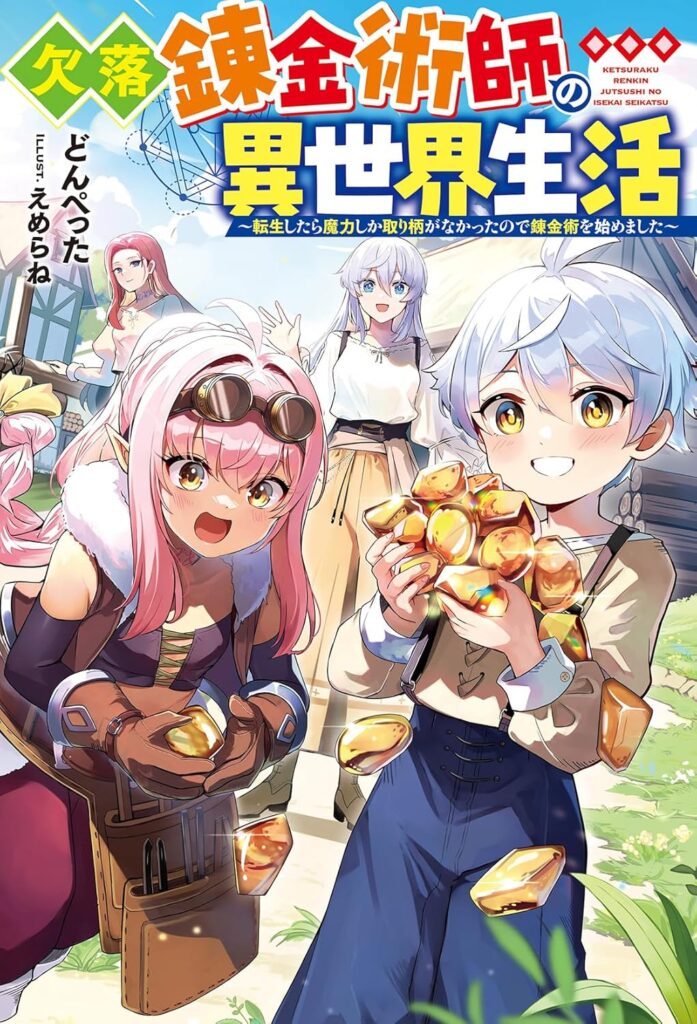
Kays Translations
Just another Isekai Lover~
Chapter 24: The Bronze-Rank Alchemist, Rombaut
― [Meluestat – Baron Merlot’s Estate, Underground Conference Room] ―
Several days had passed since the dinner gathering — a tense but uneventful affair that, thankfully, concluded without incident.
Today, however, marked a far more significant occasion. For the first time, we were to meet with Rombaut, the man once known throughout the city by the unfortunate moniker “The Alchemist Who Couldn’t Become One.” He had recently been purchased by the Baron’s household, and this meeting was meant to determine what role, if any, he could play in our new enterprise.
According to Tobias, Rombaut had been born the third son of a family that ran a small magic tool shop under the umbrella of one of the empire’s largest trading companies. The family’s future had already been laid out before him: the eldest son was to inherit the shop, while the second son worked as a craftsman repairing magical devices. With no place left in that structure, Rombaut had set his sights on alchemy, determined to make his own way in the world.
He entered the Academy of Nobles, enrolling in the alchemy department. For two years, everything seemed to go smoothly — until one day, he was abruptly summoned home, expelled from the academy, and sold into slavery.
The reason, he later learned, was a tragedy. A magical tool repaired by his second brother had malfunctioned, causing a massive explosion in a noble’s mansion. The blast half-destroyed the building and left many injured. To pay for the damages, the family was forced to give up everything — even their freedom. They were all sold into slavery, one by one.
Despite his misfortune, Rombaut had managed to retain a modest level of skill. He could create antidote potions, though only for a limited range of poisons — the paralytic venom of frogs and the corrosive toxins of certain spiders. Both were considered weak poisons, and thus his potions held little commercial value. That lack of demand explained why no one had thought him worth purchasing as an alchemist — until now.
“Nice to meet you. My name is Rombaut.”
The man standing by the wall bowed politely. His voice was calm, though faintly tinged with nervousness.
He was lean, almost fragile-looking, with shoulder-length black hair tied neatly behind his head. Dressed in plain clothes, he still carried an air of quiet intellect — the sort of man who, if given a white coat, might easily be mistaken for a physician or scholar.
“Nice to meet you as well,” my mother, Martine, replied with her usual poised grace. “This is my son, Arthur.”
“I’m Arthur,” I added quickly, offering a polite nod
“Thank you for receiving me,” Rombaut said, bowing once more. His manners were impeccable — perhaps a remnant of his former life.
Mother and I took our seats at the long conference table. Behind us, Stefana and Rugena stood silently along the wall, alert but still. Across from us sat Eldrus and Sebience, while Rombaut remained standing near the far end of the room, still uncertain of his place.
“Before we begin,” Mother said gently, “it must be difficult to speak from all the way over there. Please, take a seat.”
“Ah… but, my lady…” Rombaut hesitated, clearly unsure whether he was permitted such comfort.
“It’s all right,” Sebience interjected firmly. “Martine-sama has granted permission. Sit down.”
After a brief moment of hesitation, Rombaut obeyed. The sound of the chair scraping softly against the floor echoed through the quiet chamber. Once everyone was seated, Eldrus folded his hands on the table and took the lead.
“I was told you wished to speak with Rombaut,” he began, his tone calm but probing. “Has some problem arisen with him?”
Mother shook her head. “No, nothing of the sort. His record contains no issues. Today’s discussion concerns the glassworks project — specifically, aligning the role of an alchemist within the enterprise with the skills Rombaut has already mastered.”
It was a necessary precaution. If the alchemy techniques I had learned through books differed too greatly from what Rombaut had been formally taught at the academy, inconsistencies could arise — potentially jeopardizing the success of our glass production line. The purpose of this meeting was to prevent such oversights before they could occur.
“I see,” Eldrus nodded, evidently satisfied. “Then let us speak freely until we are all in agreement.”
“First,” I began, “Rombaut, have you understood what an alchemist’s duties will be within our glassworks operation?”
“Yes,” he replied promptly. “There are two main tasks: purifying the raw glass and shaping it into lenses for spectacles. These two responsibilities, I was told, will fall under the alchemist’s domain.”
That was correct. The basic crafting — melting, forming, cutting — would be done by glassworkers. But the critical steps of purification and precision shaping required delicate alchemical control, far beyond ordinary craftsmanship.
“Do you have any questions or thoughts about that?” I asked.
Rombaut hesitated. His eyes darted briefly toward Eldrus and Sebience, as though silently asking if it was truly acceptable to speak his mind.
“You may speak freely,” Sebience assured him.
“Then… if I’m to be honest,” Rombaut began slowly, his voice trembling just slightly, “at first, I thought this work was something that belittled alchemists.”
Mother’s expression stiffened. “And why do you think that?”
“Well,” he continued, his gaze lowering, “tasks like ‘just purifying’ or ‘just shaping’… even a Copper-ranked alchemist — the lowest class — could handle that. It felt like work unworthy of someone who bears the title of alchemist.”
He wasn’t entirely wrong. At the Noble Academy, the alchemy department ranked its students by merit — Copper, Silver, and Gold. Each year’s curriculum, once mastered, granted a corresponding badge. Earning all three allowed one to graduate with the Master’s Emblem, into which the three smaller badges were inlaid — the formal proof of an officially recognized alchemist.
“I only ever earned the Copper badge myself,” Rombaut admitted with a faint, self-deprecating smile. “So perhaps I’m in no position to speak. But asking a proper alchemist to perform such menial work would… well, it would feel like an insult to the profession.”
“I see…” I murmured. “Then if we tried to hire a professional alchemist for this task—”
“They would almost certainly refuse,” Rombaut said, cutting in with quiet certainty.
So that was that. There would be no point in searching for established alchemists, then. Tobias would have to adjust his recruitment efforts accordingly.
“By the way,” I asked, curious, “in the academy, if a student fails to brew potions or earn badges, are they expelled?”
“Expelled?” Rombaut blinked in surprise. “Ah… I don’t think so. Not officially, anyway.”
He explained that while some students left due to financial strain or personal choice after failing to advance, the academy itself rarely expelled anyone for poor performance. Apparently, nobles considered expulsion a disgrace that tarnished not just the student but the entire family name. To avoid political backlash, the academy had quietly abolished the expulsion system altogether.
“So no one gets expelled,” Rombaut concluded, shrugging. “They just… graduate without ever earning a badge.”
I frowned slightly. An academy where everyone graduates regardless of merit? That hardly sounded like a respectable institution for learning.
“I see. And is there anything else you found puzzling about the glasswork process?”
“Actually, yes,” Rombaut said, brightening a little. “I was wondering why we don’t use an alchemy cauldron for this. If we engraved the transmutation circles for heating, purification, and shaping directly into the cauldron, the process should be far more efficient. But the instructions mentioned using alchemy plates instead. Why is that?”
His question made sense — at least, to someone more familiar with alchemical equipment than I was. Apparently, a cauldron could hold multiple transmutation arrays, but unlike the alchemy plate, it didn’t generate a protective sphere field around the target material.
Within a sphere field, molten glass would gather neatly at the center, never touching the sides. But without that containment, the molten material would inevitably come into contact with the cauldron itself — a dangerous proposition.
“Wait,” I asked, “is it even safe to pour molten glass into an alchemy cauldron?”
Rombaut blinked. “It isn’t?”
I sighed inwardly. Even he didn’t know for sure. Not that I was any better — I’d never actually seen a real cauldron or plate in use.
Turning around, I called out, “Rugena, do you know anything about that?”
The maid straightened slightly, answering in her soft, measured tone. “Black steel and mithril melt at roughly the same temperature as iron. Glass requires similar heat. It might not melt the cauldron immediately, but it would likely damage it over time.”
I nodded thoughtfully. “So it would still have an effect. Meaning… we can’t really use the cauldron safely.”
Rombaut, meanwhile, frowned in contemplation. “Couldn’t we just create a sphere field within the cauldron, then?”
Eldrus chuckled dryly. “That would defeat the purpose, wouldn’t it? Cauldrons were designed to skip the sphere field so multiple transmutation arrays could operate simultaneously. Add the sphere back in, and it’s no different from an alchemy plate.”
Ah, so that was the trade-off. Cauldrons prioritized versatility at the cost of precision. Plates, on the other hand, offered focused stability — perfect for something as delicate as glasswork.
Still, a question lingered in my mind. Why had no one ever tried improving the transmutation arrays themselves? Was no one researching ways to combine the two systems? It seemed… wasteful.
I filed that thought away for later. There would be time to investigate. For now—
“Then it’s decided,” I said. “We’ll use alchemy plates.”
Rombaut nodded reluctantly. “Plates do consume more mana since they generate the field… but it can’t be helped.”
That made sense. The higher mana cost was the price of safety and quality.
“How many transmutations could you perform in a day?” I asked.
“That depends on the volume,” Rombaut replied. “But I’d estimate somewhere between fifteen and twenty sessions per day.”
I did a quick mental calculation. That might not be enough for large-scale production. We would likely need several alchemists — perhaps Copper or Silver-ranked — working in shifts to maintain output.
And with that realization, the direction of our project began to take clearer shape.
What had started as a cautious discussion about one man’s role was slowly turning into the foundation of an entirely new industry.
